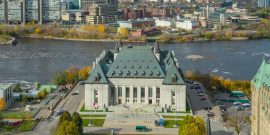Canada seems stuck in a 50-year cycle of decadence driven by baby boomers’ demands, interests, and needs.
Northern Illiberalism
Editors’ Note: This essay is part of a symposium, Reflecting on Canada Day.
When the Fathers of Canadian Confederation met in London in 1866, there was no name or rank for the incipient state. We might have been the Kingdom of Canada, or the United Provinces of Canada; both were mooted. In the end, the provinces formed “One Dominion under the Name of Canada.”
The suggestion of Dominion came from Samuel Tilley of New Brunswick, inspired by a phrase in the Book of Psalms: “He shall have dominion also from sea to sea, and from the river unto the ends of the earth.” Indeed, the fact that the Canadian political entity persists from the flinty shores of Newfoundland in the East to the rainforests of Tofino in the West, with tundra, the wonder that is Quebec, and the endless fields and grain elevators of the Prairies in between, is a miracle in and of itself.
The legacy of Pierre Elliott Trudeau, aside from producing Canada’s less-adept though brawnier current PM Justin, was to see to the enactment of the Charter of Rights and Freedoms, Canada’s entrenched bill of rights, in 1982. Instead of acting as a bulwark against state overreach though, the Charter has often served to prop up a roving legal commission in the form of appellate judges who quickly embraced a progressive philosophy of judicial interpretation.
The “living tree” approach to Charter interpretation preferred by Canadian jurists empowers the courts to create rights or obligations that are found nowhere in the democratically enacted text and, in doing so, places complex policy choices in the hands of nine unelected individuals who have no special expertise in these issues and typically represent a privileged and cloistered segment of society.
However, this sweeping grant of powers to unelected judges was far from what was envisioned when the Charter was adopted in 1982. As former Attorney-General Roy McMurtry described leading up to its adoption, the Charter is not a revolutionary document akin to the American Bill of Rights; rather, it represents a “further evolutionary development of a state which evolved peacefully from colony to full independence,” which had already “enjoyed an enviable level of freedom.”
It is for this reason that a certain breed of monarchy-loving Canadian prefers to refer to Canada Day as Dominion Day, i.e. the day in which Westminster passed legislation devolving all substantive powers to its former colony. Canadians did not “liberate” ourselves from colonial masters like our rowdier American co-subjects, but are instead the inheritors of institutions and attitudes bequeathed to us by the great British tradition of freedom.
Things might not have gone this smoothly. Canada could easily have faced the rockier fate of Ireland, or more particularly Northern Ireland. In the 1860s, Canada and Ireland were both colonies seeking self-government. Both were also wracked by seemingly unbridgeable ethnic and religious divisions that threatened to break into violence and tear the country apart (Toronto was intensely Protestant, while Quebec uniformly Catholic). In the case of Northern Ireland, this resulted in decades of war, the Troubles, domestic terrorism and counter-terrorism. Canada was spared, perhaps due to all of that space to work things out.
The Dominion Act preserved the Queen’s role as Head of State, represented in Ottawa by her Governor-General. However, the status of Her Majesty’s representative has been a fraught one in Canada lately. Prime Minister Trudeau’s appointment for Governor-General, former astronaut Julie Payette, resigned following a workplace review that found she had presided over a “toxic workplace environment”—possibly the most Canadian political scandal ever.
Trudeau has yet to appoint a replacement Governor General in the five months since Payette’s departure. In accordance with Letters Patent decree, the role is being temporarily held by the Chief Justice of the Supreme Court. This has led to an awkward situation where the same guy who appoints senators and grants Royal Assent to laws sits on the court which determines their constitutionality.
The Fathers of Canadian Confederation placed a high premium on liberty. But unlike the American revolutionaries, who often spoke of liberty as an a priori concept found in the laws of nature itself and rooted in individual rights, Canada’s founders were inspired by Burkean notions of liberty. For them, liberty was not an individual endeavor but formed in “social freedom” which is “secured by well-constructed institutions”. Canada’s founders and early statesmen saw liberty as a function of political society and human experience, and thus, to be defined and limited by the people themselves through their elected representatives.
When liberty doesn’t exist a priori but instead must be mediated through the people’s representatives, groupthink and political exigency can do a lot of damage. From the outset of the pandemic, Canadians have witnessed an extraordinary—and extraordinarily uncontested—outgrowth of governmental powers and assault on individual liberties. The Macdonald-Laurier Institute, in its COVID Misery Index, ranks Canada’s overall misery as greater than the United States, taking into account governmental measures, economic damage in addition to disease spread. Of advanced countries, only Italy, Belgium, France and Spain fared worse.
Any way you calculate it, there was plenty of misery to go around during this outbreak. The country’s most populous provinces, Ontario and Quebec, endured some of the world’s longest lockdowns. Restaurants in Toronto were shut down for more than 360 days over the course of the pandemic, the longest period of any city in the world (they still are only permitted to serve on patios, despite Ontario’s 75% vaccination rate). As the country went into lockdown in April 2020, the federal government attempted to pass legislation which suspended the power of Parliament over taxation and spending until the end of 2021 (over widespread outrage, they retracted it). In Quebec, 8pm curfews were enforced for almost three months. The provincial governments seemed to become more desperate and incompetent with each wave.
The Fathers of Canadian Confederation placed a high premium on liberty. But unlike the American revolutionaries, who often spoke of liberty as an a priori concept found in the laws of nature itself and rooted in individual rights, Canada’s founders were inspired by Burkean notions of liberty.
Pandemic-related hospital measures have resulted in a backlog of 15.9 million cancelled surgeries, worsening the pressure on a system already crushing under the weight of an aging population and care based on government rations. Indeed, Canada is the only country in the world that effectively bans all forms of private-pay health insurance. In spite of enforcing a monopoly on care, Canada also presents patients with some of the world’s longest waiting lists. Permitting private options is a political hot potato in Canada which no party has been willing to handle. However, the legal charity I direct, the Canadian Constitution Foundation, has been supporting litigation which holds that the government cannot simultaneously fail to provide timely care and actively prevent individuals from choosing to end their suffering and pay for their procedures. The government has frequently resorted to painting doctors as untrustworthy and liable to abandon the public system in their defense of the case.
Many of the pandemic measures imposed lacked even the pretense of being connected to a valid public health rationale: several provinces ordered stores to tape off aisles selling non-essential goods, so that you could buy dog food and milk but not garden fertilizer at the local Wal-Mart. The City of Toronto roped off its beautiful flowering cherry blossom trees, and even drive-in church services, Christmas light displays, and movies were banned.
The highwater mark of Ontario Premier Doug Ford’s pandemic ignominy was on April 16th, during the province’s third wave. Ford announced the toughest measures the province had brought to date: a stay-at-home order, closure of parks and playgrounds despite clear evidence by that point that neither children nor outdoor activities were driving infections, and most stunningly, new police powers to question any person outside their home as to what their essential reason for being out was. Civil liberties groups immediately noted that this would result in disproportionate impact on racialized, heavily policed areas like Toronto’s exurbs. Facebook Mom groups erupted in rage at their last refuge for their children, with lengthy school closures, now snatched away. The latter policy was short-lived: it was announced late on a Friday afternoon and by midday Saturday all of the province’s local police forces announced on Twitter that they would not be randomly stopping citizens on the street. Ford sheepishly quickly reversed course on both the police powers and the playgrounds the same day.
Canada is an odd and still overall delightful place to live: geographically blessed with an abundance of natural resources which are frequently gridlocked from development due to unending regulatory consultations and litigation, a friendly and prosperous neighbor to the South who has been barred from visiting for a year and a half with ongoing border closures, an urbane and educated population whose speech and online activities is menaced by the current Liberal government. Still, I wouldn’t wish to spend my life anywhere else. Happy Canada Day.



